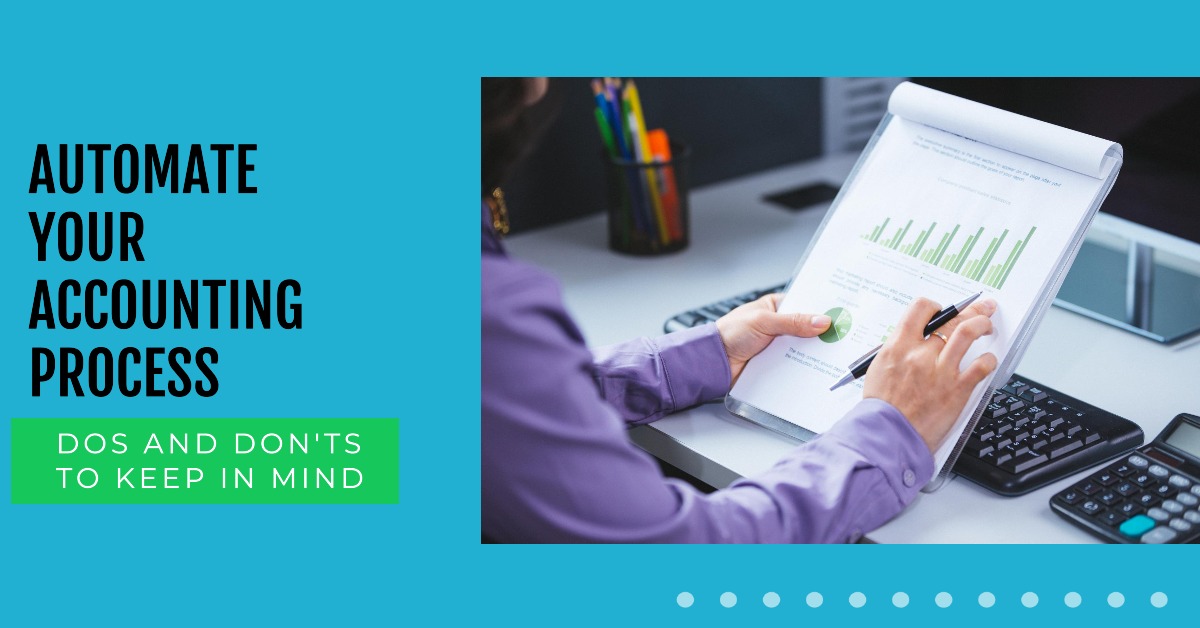
Automating business processes has become the norm in the past few years. It allows business setups to utilize their resources efficiently by automating repetitive and time-consuming tasks. It also helps the top talent to pay attention to the more demanding tasks that need greater human supervision. Accounting is the most crucial business area that can excel with the implementation of process automation.
However, it does not mean you can randomly automate all accounting operations and expect the perfect results in return. Accounting process automation also has a few limitations, along with its never-ending perks and benefits. So, sticking to the dos and don’ts can help ensure you only enjoy the benefits.
Give an in-depth read to this article to get your hands on the dos and don’ts of accounting process automation and implement them effectively to grow profits and limit losses.
Top 3 Dos of Accounting Process Automation
Accounting process automation can help limit the manual hassle of the workforce and organizations. However, it is only possible when they implement it efficiently and utilize it well. Following some basic practices and dos can help you maximize the perks while keeping losses at bay.
Here are the major dos of accounting process automation that business organizations should implement efficiently.
1. Automate Long and Repetitive Tasks
Automating long and repetitive tasks is the basic do of accounting process automation. The basic purpose of automation is to facilitate the workers and organizations. So, automating repetitive tasks like data entry, scheduling, and document management is the best strategy. It will free up the time of the workforce and help them focus on more productive and demanding tasks. Organizations consult Xero accounting specialists to invest in it and automate long and repetitive tasks.
2. Link Automation with Human Supervision
Linking the automation process with human supervision is the next crucial do you should never ignore. Though automation has higher expertise in managing repetitive tasks efficiently, it cannot compare with human judgment and expertise. It is only there to facilitate human beings and not replace them. It is also not free of error; therefore, you must link it with human supervision. It allows the satisfaction that all tasks are being handled accurately. However, you also need to assess which automated tasks need supervision and which are good on their own.
3. Gradually Eliminate Manual Tasks
Gradually eliminating manual tasks is the next major step in accounting process automation. Automating all the tasks at once is quite overwhelming for the workforce and makes it difficult for them to manage everything efficiently. Start the automation process with simple and easier-to-manage tasks and proceed gradually to the more complex ones. It will take the load off the shoulders of the workforce, boost their productivity, and optimize the outcomes of the process, too.
Top 3 Don’ts of Accounting Process Automation
Maintaining a balance and following a fair use policy is applicable to everything, and accounting process automation is no exception. It is because the overuse of automation can expose the authorities to certain challenges and issues, which may cause irreparable loss. You must implement accounting process automation in moderation and beware of certain don’ts to maximize profits.
Here are the major don’ts of accounting process automation business setups and organizations should be aware of.
1. Expect Error Free Results
Expecting error-free results is the basic don’t of accounting process automation organizations need to watch out for. Automated systems can face issues like incorrect data entry, software bugs, and unexpected changes in the process. These can cause errors in the results. So, you must not develop unrealistic expectations. Instead, test and monitor the automated processes to identify and fix the errors. Moreover, implement data analytics to explore error patterns and resolve them effectively.
2. Over-rely on Automation
Over-reliance on automated operations is the next don’t of accounting process automation you must take seriously. It boosts productivity and limits the load; however, it cannot overshadow human expertise and judgment. Overreliance on automation can hinder your ability to foresee and deal with unexpected challenges. Moreover, it significantly undermines the flexibility of business operations. So, you must prioritize human supervision and use automation for productivity boost.
3. Set Unrealistic Expectations
Setting unrealistic expectations is the last don’t of accounting process automation organizations should be aware of. Most authorities expect a high return on investment as soon as they automate the processes. The technology comes at the expense of implementation and maintenance and requires a little time to offer real perks and benefits. You can contact Xero accounting services to learn the details of expenses and expectations regarding ROI and make a rewarding choice for your setup.
Do You Need Help with Accounting Process Automation?
If you are concerned about the implementation of accounting process automation, consulting the experts is the best option. Get in touch with professional accounting software service providers to clear all your concerns and invest in them to maximize your profits.


